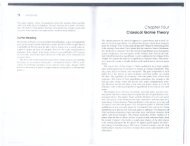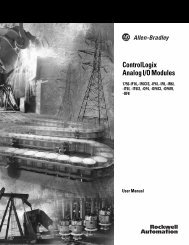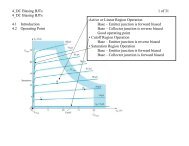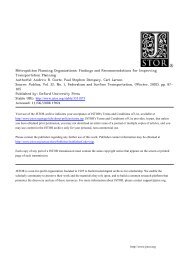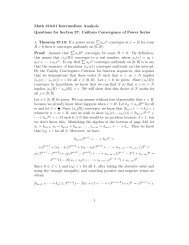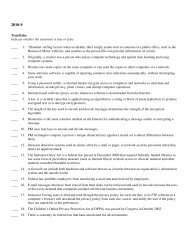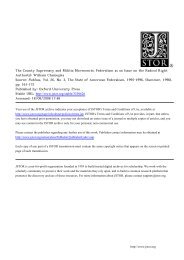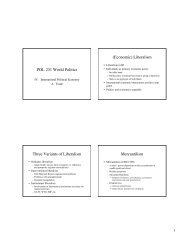Clemons and McBeth - MavDISK
Clemons and McBeth - MavDISK
Clemons and McBeth - MavDISK
Create successful ePaper yourself
Turn your PDF publications into a flip-book with our unique Google optimized e-Paper software.
50 PAlUI . THEORY AND PRACTICE CHAPTER3 . CRITIQUES OF THE RATIONAL ApPROACH 61<br />
I<br />
Does organizational welfare outweigh honesty?<br />
. Depending on how the analyst h<strong>and</strong>les each case, who are the potential winne{s<strong>and</strong>losers?<br />
Would you really evaluate yourself out of a job?<br />
I<br />
I Scenario #1: Metroville Urban Renewal<br />
I HenryisapolicyanalystfortheMetrovilleCityPlanningDepartment.HiscUlTentassignment<br />
I is to stUdythe effects of 10 years of urban development projects sponsored by the department<br />
A significant amount (more than two-thirds) of the project has been funded by federal grant<br />
Ifunds. Federal guidelines accompanying these funds stipulate that "urban renewal must sig-<br />
Inificantlyassist disadvantaged populations." While conducting a stakeholders' analysis, he<br />
idiscovers that there is wide-scale citizen opposition to the continuation of the renewal work.<br />
I Foremost, critics contend that the development policy in Metroville has uprooted poor fami-<br />
I lies <strong>and</strong> small businesses <strong>and</strong> advantaged upper-middle-class farnilies<strong>and</strong> corporate interests.<br />
I The>director of the planning department (who is Henry's boss) recently won a national<br />
:award for his work in Metroville's urban renewal. If Henry reports the citizen's complaints,<br />
I he might well trigger a federal investigation, <strong>and</strong> Metrovillemight lose future funding <strong>and</strong><br />
I evenfacefinesfor misuseof past grantfunds.Henry'spositionis fundedby federal<br />
, monies, <strong>and</strong> the department has several exciting new urban renewal projects on the front<br />
Iburner. How does Henry h<strong>and</strong>le the information from Metroville's citizen stakeholders?<br />
I<br />
, Scenario #2: The InnerCity DrugProgram<br />
I Malinda isa policy analyst working for a state welfare agency. For the past five years the<br />
Iagency has sponsored antidrug programs in local school districts with inner-city high<br />
schools, including East High, which is right across the street from the,house where Malinda<br />
lived when growing up. The program has been a tremendous political asset for the agency<br />
I<br />
, because it allows agency personnel to have considerable interaction with local school districts,<br />
parents, <strong>and</strong> others. Through hard work, the agency's programs have increasingly reflected<br />
its commitment to a philosophy of community outreach. Malinda is very committed<br />
to the program, played a significant role in its planning <strong>and</strong> implementation, <strong>and</strong> believes in<br />
I her heart of hearts that "this program really helps these inner city kids."<br />
She has been charged with conducting an evaluation of the program. Her extensive evaluation<br />
has been unable to document any successes in reducing drug use among urban high<br />
school.students. In fact, her data demonstrate that drug use in the schools in the program has<br />
actually increllliedover the past five years. Despite the data. she still believes in the program<br />
<strong>and</strong> inher work inimplementing it. Many in the state legislature would like to see the program<br />
cut l}ecausethey believe the welfare agency-in becoming involved in community outreachhai<br />
overstepped its mission. However, the director of the welfare agency recently wrote a<br />
report in which sbe stated, "The inner-city anti-drug program is a model of how the agency<br />
can positively affect local communities." How does Malinda h<strong>and</strong>le this evaluation task?<br />
Scenario #3: Commercial fishing in lakeside<br />
Joe is an analyst for a state commercial fishing agency. The job of the agency is to regulate<br />
commercial fishing in the state. Lakeside is a fishing community that has relied<br />
extensively on commercial fish catches from a huge lake. Recently, the fish population has<br />
declined dramatically,. <strong>and</strong> fish catches have dropped precipitously-to almost nothing.<br />
There are certainly not enough fish now to support commercial fishing. Three years ago,<br />
against heavy political pressure from environmental groups, Joe's agency implemented<br />
new regulations aUowing for much larger catches of fish. In addition, the agency at that<br />
timeaUowed (for the first time) commercial <strong>and</strong> residential development along the shores<br />
of the waterfront. Joe's task is to detelTnine the cause of the fish population decline <strong>and</strong> to<br />
write a report on his conclusions.<br />
The governor of the state, the mayor of Lakeside, <strong>and</strong> the director of the fishing<br />
agency have all publicly stated that the cause is simply "mother nature" (increases in water<br />
temperature, disease, poor food years, etc.) The director of the agency (who hired him)<br />
told Joe directly that "This is a natural. problem, but a lot of environmental groups will try<br />
to blame our new regulations. Your job is to show that our regulations had nothing to do<br />
with the problem." After much serious study, based on a wealth of scientific studies funded<br />
byhis..agency<strong>and</strong> the state university, Joe concludes that the decline in the fish population<br />
is due almost solely to a combination of over-fishing <strong>and</strong> pollution directly linked to the<br />
increased development on the shores of the lake. If he reports this information, his agency<br />
will face a major shake-up, <strong>and</strong> the director wiU almost certainly be fired. The press <strong>and</strong><br />
the environmental groups will have a field day with this <strong>and</strong> both the mayor <strong>and</strong> the governor<br />
will suffer politically. What should Joe do?<br />
~,~""'."..""''-'''''''...,<br />
As you can see in the mini-case on pages 59-62, role tends to complicate things. Imagine<br />
a proposal to completely ban alcohol on a campus, including fraternity <strong>and</strong> sorority<br />
houses. Would the attitudes toward such a proposal likely be different, whether you drink or<br />
not, if you were one of the following?<br />
I. A student living in an expensive on-campus apartment?<br />
2. An officer in a fraternity?<br />
3. A faculty member?<br />
4. A vendor?<br />
5. An employee of campus security?<br />
6. A member of the administration?<br />
7. An admissions counselor?<br />
8. The college's attorney?<br />
The point is that "policy decisions are made not by abstract people, but by people in particular<br />
roles <strong>and</strong> settings, using particular procedures, <strong>and</strong> addressing particular audiences"<br />
(Stone, 1988, p. 20).<br />
One of the classical bureaucratic pathologies often cited as a natural outcome of large<br />
organizations is over-quantification. Over-quantification is an example of confusing the ends <strong>and</strong><br />
the means.' In a similar vein, the expansion, protection, <strong>and</strong> survival of the organization sometimes<br />
become the informal mission of the organization. Just as individuals within organizations<br />
'Body counts during the Vietnam War. an off-shoot of McNamara's systems anaJysis, are often cited as an<br />
example of both over-quantification <strong>and</strong> confusing ends <strong>and</strong> means (it was not measuring strategic success. only<br />
tactical success).



